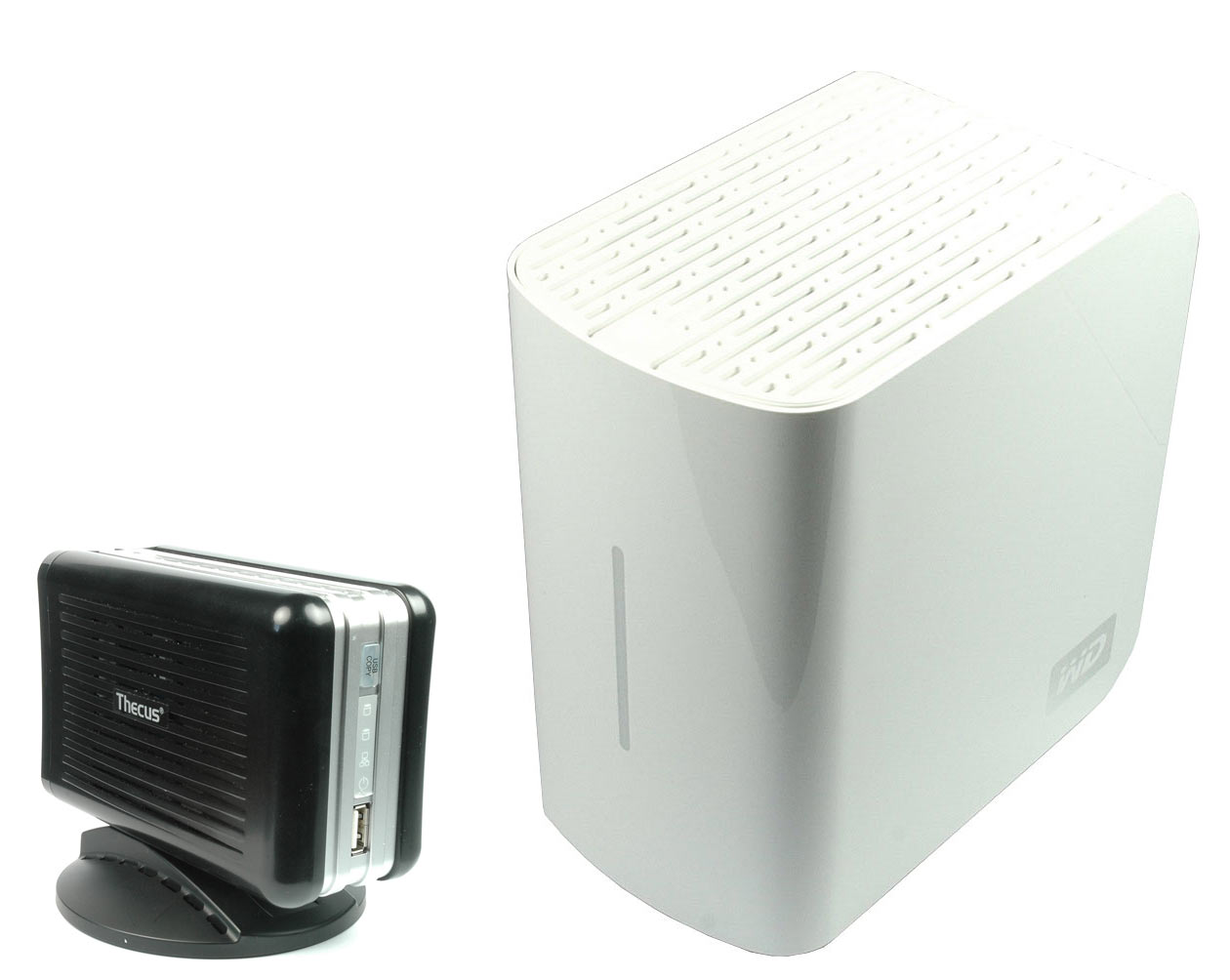NAS Attack: Network Storage From Thecus And Western Digital
Attractive New NAS Options
Network-attached storage (what we commonly refer to as NAS) is probably the easiest way to make data easily accessible in a connected environment, as it facilitates the exchange of files and eliminates redundant storage. It often also introduces additional network features, as most NAS boxes aren’t just simple storage devices anymore.
Thecus believes that NAS devices powered by small and quiet 2.5” hard drives make the most sense, and Western Digital sent us its latest high-capacity NAS product for review.
Network Storage for All
The market for NAS devices has undergone a similar fragmentation as the hard drive market, as there are devices for consumers, prosumers, and small business applications. Simple NAS devices utilize a single hard drive, while more versatile and powerful boxes utilize at least two drives, adding a redundancy option through RAID 1. Professional NAS solutions are typically RAID 5-capable and support between four and eight hard drives, enabling high-capacity storage as well as a comforting degree of data safety.
We received Western Digital’s MyBook World Edition II, which is based on RAID 0 or RAID 1 and two 2TB 3.5” WD Caviar Green hard drives. The second candidate in this review is the Thecus N0204, a BYOD-type product (build your own device), meaning that you can use two 2.5” SATA drives of your choice. There are few similarities between this pair, apart from the fact that both are NAS devices.
High Capacity by WD, Small Dimensions by Thecus
The MyBook World Edition II offers significant storage capacity starting at around $500 (for the 4TB model), offering a dual drive 3.5” solution. Thecus instead focused on reducing the physical footprint of external storage with its miniNAS N0204. The enclosure starts at roughly $150, but you still have to add two drives, which will effectively take you to $250-400. You’ll find detailed product information, feature discussion and performance evaluation on the following pages.
Get Tom's Hardware's best news and in-depth reviews, straight to your inbox.
Current page: Attractive New NAS Options
Next Page Western Digital MyBook World Edition II-
usasma Nice review. I would have appreciated it when purchasing my latest NAS device (Netgear DNS-323).Reply
I've lost faith in the W-D MyBook type devices recently - having had several that have failed due to issues with the circuitry in the case (NOT with the hard drive itself). -
evongugg It would be nice to benchmark a FreeNAS or Openfiler box next to these units. My FreeNAS was free, made of left over parts and is very fast.Reply
It also has a whole lot of features.
-
jblack Why in the world would RAID 1 perform better than RAID 0? --- You'd think at BEST they would be equal.Reply
-
fromeast2west An Atom powered mini-server should be able to match these on both price and power consumption, and destroy them when it comes to features.Reply
I like the idea of a NAS, but haven't seen any company produce one for a price that is in line with performance they offer. -
jasperjones Thanks for the review!Reply
Can you comment on fan noise? Is it audible when the devices are idle?
Asking cause I live in a cozy Manhattan studio ;) -
jawshoeaw The NAS concept continues to be overpriced I think. Still haven't seen a fast 802.11N device. There is something to be said for a simple design with fewer parts to go bad (so the homebrew NAS box is cheaper but more fault prone) - I'd like to see some longevity figures, though of course I would not expect toms to sit around for a couple of years waiting for the NAS to break. Maybe something like the consumer reports long term testing of cars.Reply -
dje007 Thecus’s support is the crappiest I have seen in a long time stay away from them plus there code is bad the only thing it has going for it is linux, if you are looking for a good nas with the ablitly to fix issues your self try QNAP they have a VGA output and give you root access.Reply -
SchizoFrog This review is rubbish... out of the whole genre of NAS it includes 2 individual items, is that it, 2, just 2???Reply
But lets get to the real nitty gritty... Nas is all about network performance, so where are the details about the inbuilt processors and technical specs? There is so much more to account for when buying and setting up a NAS item than just 'Oh look, we can open this box... OOOHHH!!!'
Talk about N00B article... FAIL!!! -
SchizoFrog jblackWhy in the world would RAID 1 perform better than RAID 0? --- You'd think at BEST they would be equal.You obviously have no understanding of RAID and its configurations... No offence intended but go read:Reply
http://en.wikipedia.org/wiki/RAID#Standard_levels -
deanbug I see both points. In theory 0 should have better read/write than 1, but it is limited to the source/destination speed of the drive.Reply
IMHO raid 1 or 5 is for consumers that really want their data, or for businesses. 0 is for people that don't care about data, gamers for fast map load times, or Ninja's:)
(had to have some fun
Obviously there are other uses, for both, but I think those are the most common.

